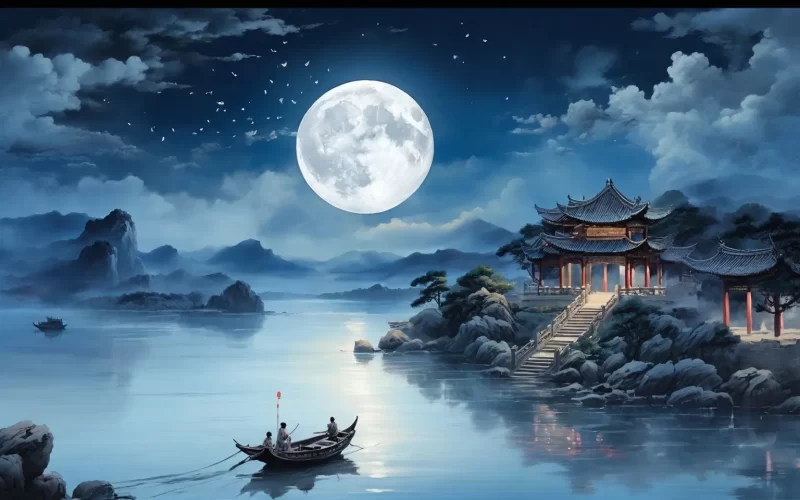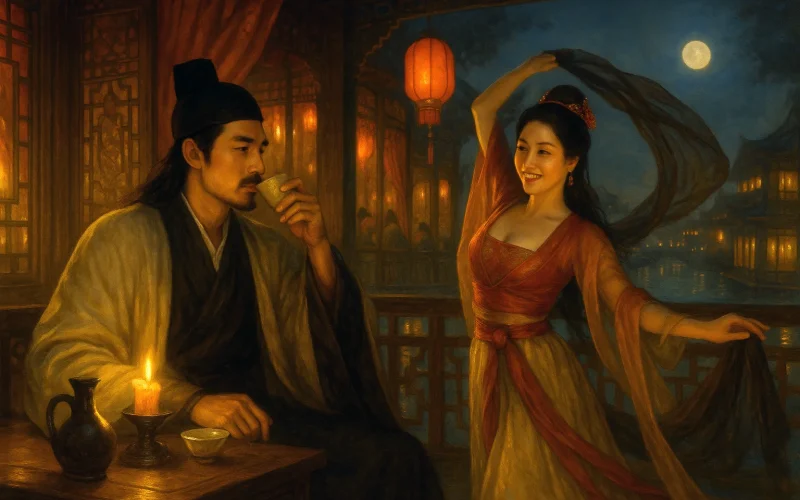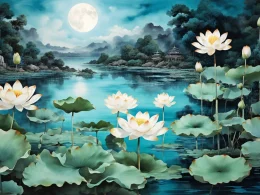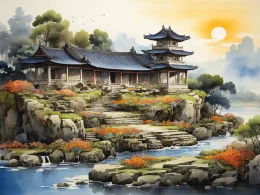Mist veils the cold stream, and moonlight the sand,
As I moor in the shadow of a river-tavern,
Where girls, with no thought of a perished kingdom,
Gaily echo A Song of Courtyard Flowers.
Original Poem
「泊秦淮」
杜牧
烟笼寒水月笼沙,夜泊秦淮近酒家。
商女不知亡国恨,隔江犹唱后庭花。
Interpretation
This poem was composed around 850 AD during the Dazhong reign period of Emperor Xuanzong of Tang, posthumously honored as the "Little Taizong" for his attempts to reinvigorate the dynasty. However, the empire remained deeply afflicted by entrenched maladies: separatist military governors, dominant eunuchs, and intense factional strife. Its surface stability belied a reality of internal decline. As Du Mu moored his boat on the Qinhuai River that night, this waterway—which had witnessed the opulence of the Six Dynasties and, most pointedly, the notorious extravagance linked to the last ruler of Chen's composition Jade Tree, Rear Court Flowers—inevitably stirred the poet's profound historical consciousness and sense of foreboding.
During the Tang era, the Qinhuai River remained a thriving center of commerce and entertainment, lined with singing pavilions and wine shops, its nights filled with incessant music and revelry. Mooring at this confluence of history and contemporary life, Du Mu's sensitive ear perceived not merely the decadent melodies of the moment but also the echoes of a fallen kingdom, reverberating across a century. The poem's power stems from the poet's masterful execution of a layered temporal vision: he perfectly frames a late Tang scene within the historical context of a Southern Dynasties collapse, thereby elevating a commonplace nighttime mooring into a stern warning against the crises of his own time. Celebrated as the pinnacle of Du Mu's political satire, its sharp critical edge and seamless artistic conception render it one of the most historically penetrating works of late Tang poetry.
First Couplet: 烟笼寒水月笼沙,夜泊秦淮近酒家。
Yān lóng hán shuǐ yuè lóng shā, yè bó Qínhuái jìn jiǔjiā.
Mist veils the cold stream, and moonlight the sand; As I moor at night on River Qinhuai near a tavern.
The opening employs two instances of the verb "veils" to intertwine four distinct images, constructing a scene of a misty, indistinct, cold, and quiet Qinhuai River nightscape. "Mist" and "moonlight" represent the diffusion of light and atmosphere; the "cold stream" and "sand" are the tangible setting. Together, they are enveloped in a tranquil yet desolate, vaporous ambiance. This serves both as realistic description and establishes the poem's melancholic and vigilant emotional tone. The second line introduces the subject: "moor at night on River Qinhuai" states the action, while "near a tavern" acts like a deft cinematic cut, redirecting the gaze and hearing toward the bustling clamor on the shore, foreshadowing the "song" in the subsequent lines and creating a latent contrast between the stillness on the river and the activity by the tavern.
Final Couplet: 商女不知亡国恨,隔江犹唱《后庭花》。
Shāngnǚ bù zhī wángguó hèn, gé jiāng yóu chàng 《Hòutínghuā》.
*The songstress knows not the grief of a conquered land,
Still singing *Rear Court Flowers* across the river.*
This couplet strikes like a stone cast into water, sending powerful ripples of implication throughout the poem. The poet employs a brilliant synthesis of synecdoche and historical allusion. The "songstress" represents the surface-level performer, but the poet's critique is certainly not aimed at these women of low social standing, who had little agency over their repertoires. The song they sing, Rear Court Flowers, was a licentious tune composed by the last emperor of the Chen dynasty, intimately linked to his debauchery and misrule—later regarded as the very symbol of "music that heralds a state's downfall." Those who truly "know not the grief" are the high officials, literati, and merchants reveling in the taverns who request these songs—the entire ruling class and social elite, intoxicated by a hollow prosperity. The word "still" in "still singing" carries immense force. It exposes the startling recurrence in the present of the core elements of historical tragedy: extravagance, moral numbness, and shortsightedness. To the poet's ear, the song drifting across the river is no longer mere entertainment but the opening notes of a chilling funeral dirge for his own era.
Holistic Appreciation
This heptasyllabic quatrain stands as an exemplary model of the perfect integration of lyrical scene-painting and political allegory. It follows a rigorous logical progression: from scene to sound, from sound to history, and from history to the present, accomplishing within merely four lines a remarkable leap from a tranquil visual tableau to historical depth and then to contemporary critique.
The descriptive imagery of the first two lines is not merely conventional. The hazy, indistinct quality evoked by "mist veils" and "moonlight… the sand" parallels a collective spiritual confusion and obscured perception within late Tang society; the imagery of the "cold stream" hints at an inner chill and latent crisis beneath the surface prosperity. The narrative and commentary of the final two lines generate intense ironic tension through "knows not" and "still singing." Using the surface-level "ignorance" of the songstress, the poet interrogates the true "willful ignorance" or "convenient forgetfulness" of the ruling class. The poem's emotional charge reaches its zenith in the final line. The sound of "Rear Court Flowers" acts like a poetic detonation within the silent night, shattering the thin veil separating history from reality, allowing all who are clear-sighted to hear the faint prelude of an elegy for their own ostensibly prosperous age.
Artistic Merits
- A Metaphorical System of Juxtaposed Imagery: The cool, quiet, and veiled realm created by the juxtaposition of "mist," "moonlight," "cold stream," and "sand" forms a core metaphorical contrast throughout the poem with the clamorous decadence represented by "tavern," "songstress," and "Rear Court Flowers." The former symbolizes a perspective of historical reflection and the poet's contemplative anxiety; the latter symbolizes the intoxication and amnesia of the present. This juxtaposition itself constitutes a powerful critique.
- Spatiotemporal Fusion Through Synesthetic Perception: The poem skillfully weaves together visual (mist, moonlight, water, sand), auditory (song), and tactile ("cold" stream) elements. Crucially, it bridges the spatial "across the river" (physical distance) and the temporal "across generations" (historical distance) through the song Rear Court Flowers, achieving a unique artistic effect where sound traverses time, making the ghosts of history audibly present in the current moment.
- Innovative and Subversive Use of Allusion: The deployment of the Jade Tree, Rear Court Flowers allusion is not mere nostalgic reference but employs it as a "historical probe" to diagnose the maladies of the present. Through the act of "still singing," the poet resurrects the ancient "music of a fallen state" within a new contemporary context, granting it acute critical power and realizing a potent re-contextualization and deepening of the allusion's meaning.
- An Indirect Yet Precise Critical Perspective: The poem's critique is not direct but employs a classic strategy of indirection. The thrust of criticism subtly shifts from the "songstress" (the apparent target) to the patrons behind her and the broader social milieu (the true targets). This technique of "criticizing one to imply another" and "using the past to satirize the present" not only aligns with poetry's aesthetic demand for subtlety but also renders the satire more biting, profound, and resonant.
Insights
This work stands as a poetic lighthouse erected upon the river of time, its beam piercing the mists of history to continually illuminate the fragile points where power and civilization can falter.
The central insight it offers concerns "historical memory" and "present responsibility." Those who "know not the grief of a conquered land" in the poem are less individuals and more symptomatic of a systemic historical amnesia and collective moral paralysis. When a society, particularly its elite, becomes engrossed in immediate splendor and clamor while selectively forgetting or ignoring lessons paid for with immense historical cost, the seeds of crisis are sown. The song of Rear Court Flowersthus serves as a litmus test: can an era recognize the "sweet poison" within its own culture?
Furthermore, the poem poses a profound question regarding "complicity" and "lucid awareness." Within the social ecosystem formed by the "songstress" and her "audience," who bears greater responsibility for forgetting the "grief of a conquered land"? The poet embeds his critique within "knows not" and "still singing," reminding us that during historical periods of decline, the majority may become, in some sense, "accomplices," actively or passively participating in a collective revelry and forgetfulness. The poet's role is that of the few lucid observers "moored" in contemplation, who, on a night when others are intoxicated, listen with poetic ears and discern the dissonant notes hidden within the celebratory songs of prosperity—the clear, warning bell tolling from the depths of history.
Ultimately, the poem's value lies not only in its precise diagnosis of the late Tang but also in its provision of a critical mode of perception for all eras: while enjoying prosperity, can one maintain a measure of detached perspective, a view from "across the river"? Amidst popular melodies, can one hear the potential echoes of old, fatal tunes within the contemporary harmonies? With his poetic brush, Du Mu admonishes later generations: the resilience of civilization depends not only on creating prosperity but, within that very prosperity, on maintaining a profound memory of historical lessons and a keen vigilance toward one's own latent crises.
Poem translator
Kiang Kanghu
About the poet
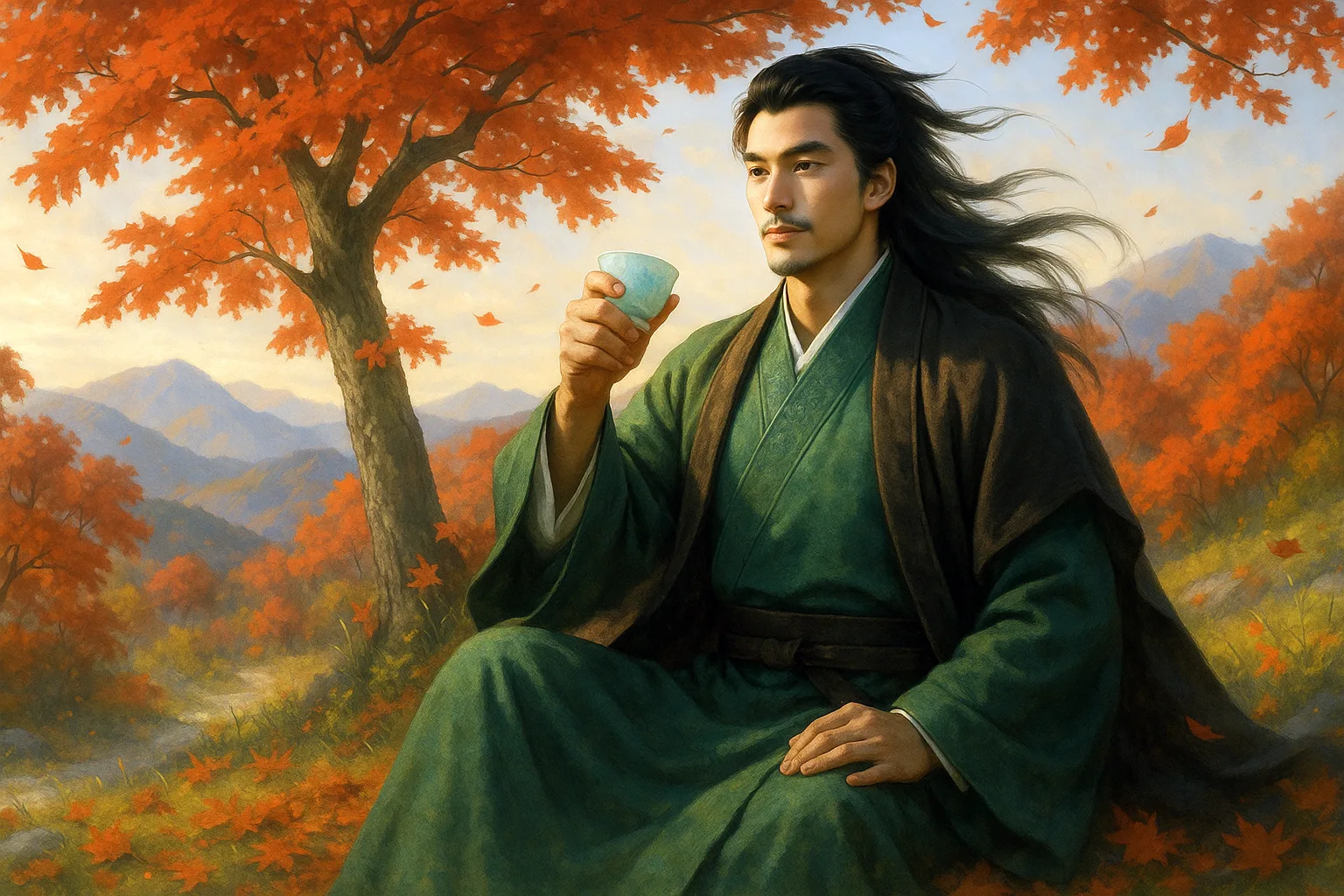
Du Mu (杜牧), 803 - 853 AD, was a native of Xi'an, Shaanxi Province. Among the poets of the Late Tang Dynasty, he was one of those who had his own characteristics, and later people called Li Shangyin and Du Mu as "Little Li and Du". His poems are bright and colorful.






